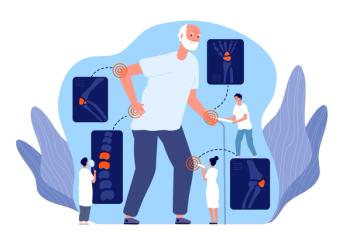
Impact of PsA Magnified When Disease Affects Multiple Areas
Using a large US database, researchers characterized the impact of psoriatic arthritis (PsA) in patients with disease activity in multiple domains vs those with disease activity affecting a single area.
Manifestations of
The researchers said they undertook
Using the Corrona PsA/Spondyloarthritis (PsA/SpA) Registry, a large, independent, prospective, observational cohort of individuals with PsA or SpA, the researchers recruited patients from 44 private and academic practice sites across 27 states.
As of June 30, 2019, data on 3939 patients with PsA/SpA had been collected. The Corrona PsA/SpA Registry includes information on 15,806 patient visits, with approximately 8423 patient-years of follow-up, with a mean time of patient follow-up of 2.9 years (median 2.4 years).
Adults with PsA enrolled in the registry from March 2013 to August 2018 were included in the study; they were classified as having multidomain (≥ 2 domains) or single-domain disease presentations.
Of 2617 patients with PsA, 1698 (64.9%) had multidomain presentations, 617 (23.6%) had single-domain presentations, and 302 (11.5%) had no active disease features.
The researchers characterized patients who began biologic treatment at study enrollment separately. Of 354 patients, 289 (81.6%) had multidomain presentations, 45 (12.7%) had single-domain presentations, and 20 (5.6%) had no active disease features.
For those on biologics with single-domain vs multidomain presentations, the mean (SD) ages were 52.5 (12.7) vs 51.5 (13.2) years, respectively. Roughly half in each group were female (47.7% and 52.2%).
Patients on biologics and multidomain presentations were more likely to have nail psoriasis, depression, psoriasis, and current use of conventional synthetic disease-modifying antirheumatic drugs than patients on biologics with single-domain presentations.
Overall, the most common single-domain and multidomain presentations, respectively, were skin disease (12.7%) and PsA plus skin disease (11.7%).
Perhaps not surprisingly, patients with multidomain disease were more likely to have fibromyalgia, depression, anxiety, and prior biologic use than single-domain presenters.
Multidomain presentations were associated with significantly worse patient and physician global assessments of disease activity, pain, and fatigue; Health Assessment Questionnaire–Disability Index and EuroQol-5 Dimension scores; and work productivity at enrollment.
The study had some limitations, such as the fact that the patient population was limited to the United States and disease domains were reported by physicians.
"These results highlight the wide spectrum of disease presentations among patients with PsA" the authors concluded. "Evaluation of the active disease domains is important for the development of an effective disease management plan."
Reference
Ogdie A, Hur P, Liu, et al. Effect of multidomain disease presentations on patients with psoriatic arthritis in the Corrona Psoriatic Arthritis/Spondyloarthritis Registry. J Rheumatol. 2021;48(5):698-706. doi:10.3899/jrheum.200371
Newsletter
Stay ahead of policy, cost, and value—subscribe to AJMC for expert insights at the intersection of clinical care and health economics.








